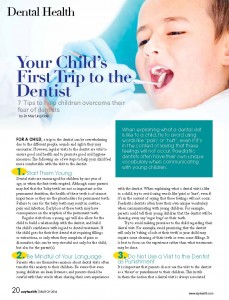This article first appeared in the March 2014 issue of Ezyhealth magazine. We have reproduced it for the information of those of you who missed it when it was published.
For a child, a trip to the dentist can be overwhelming due to the different people, sounds and sights they may encounter. However, regular visits to the dentist are vital to ensure good oral health and to promote good oral hygiene measures. The following are a few steps to help your child feel more comfortable with the visit to the dentist.
1. Start Them Young
Dental visits are encouraged for children by 1 year of age, or when the first teeth are erupted in the mouth. Although some parents may feel that the ‘baby teeth’ are not as important as the permanent dentition, the health of these teeth is of utmost importance as they are the placeholders for permanent teeth. Failure to care for the baby teeth may result in cavities, pain and infection. Early loss of these teeth may have consequences on the eruption of the permanent teeth.
Regular visits from a young age will also allow for the child to build a relationship with the dentist, and build the child’s confidence with regards to dental treatment. If the child attends for their first dental visit requiring fillings or extractions, or only when they complain of pain or discomfort, this can be very stressful not only for the child but also for the parent(s).
2. Be Mindful of Your Language
Parents who are themselves anxious about dental visits often transfer this anxiety to their children. Be aware that even young children are keen listeners, and parents should be careful with their words when sharing their own experiences at the dentist. When explaining what a dental visit is like to a child, try to avoid words like ‘pain’ or ‘hurt’, even if it’s in the context of saying that these feelings will not occur. Children dentists often have their own unique vocabulary when communicating with young children. For example, parents could tell their young children that the dentist will be cleaning away any ‘sugar bugs’ on their teeth.
Try to avoid making promises to the child regarding their dental visit. For example, avoid promising that the dentist will only be ‘taking a look at their teeth’ as your child may require some cleaning of their teeth or even some fillings. It is best to focus on the experience rather than what treatments may be done.
3. Do not use a Visit to the Dentist as Punishment
It is important that parents do not use the visit to the dentist as a ‘threat’ or punishment to their children. This instils in them the notion that a dental visit is always associated with pain or discomfort, and will always be unpleasant. It is therefore important not to paint a picture of the dentist being someone that their child should fear.
4. Role play at home
Parents can make dental visit less stressful by carrying out simple role-play with their children. Explain that the dentist will be counting your little one’s teeth. Using your child’s toothbrush, count out loud the number of teeth present. Then proceed to use the toothbrush to clean your child’s teeth. Once done, parents can ask their child to show them how to clean the teeth of their favourite soft toy or animal.
5. Read a Story Book on Dental Visits
Reading a story book with good illustrations is also a good way to help children overcome their fear of dentists. Some good examples of story books to encourage them are Peppa Pig: Dentist Trip and Topsy and Tim: Go to the Dentist.
6. Be prepared for some resistance
Even with all the preparation done to help ensure that your child’s dental visit is pleasant and enjoyable, be prepared for some fussing or resistance initially. Young children may not fully understand what the dentist is trying to do, and may not be comfortable being examined by a stranger. This may result in a crying or wriggling child. Although parents may be anxious and stressed by this, dentists and their staff will be experienced with this scenario and will do their utmost to reassure the parents.
7. Emphasise the importance of seeing the dentist
When good oral hygiene measures and regular dental visits are established from a young age, parents instil in their children that visiting the dentist is a necessity and not a choice. With time, the dental visit will be seen as a vital partnership to achieving and maintaining good oral health, rather than as a punishment for poor dietary and dental habits.
 Dr May Ling Eide is a dental surgeon with a specialist training in orthodontics at Specialist Dental Group®. She received her specialist training in Orthodontics from the University of London, United Kingdom, and is registered as an Orthodontist on the Specialist List of the General Dental Council in the United Kingdom. Dr Eide is an Adjunct Clinical Lecturer at the National University of Singapore. For more information, visit www.specialistdentalgroup.com.
Dr May Ling Eide is a dental surgeon with a specialist training in orthodontics at Specialist Dental Group®. She received her specialist training in Orthodontics from the University of London, United Kingdom, and is registered as an Orthodontist on the Specialist List of the General Dental Council in the United Kingdom. Dr Eide is an Adjunct Clinical Lecturer at the National University of Singapore. For more information, visit www.specialistdentalgroup.com.






